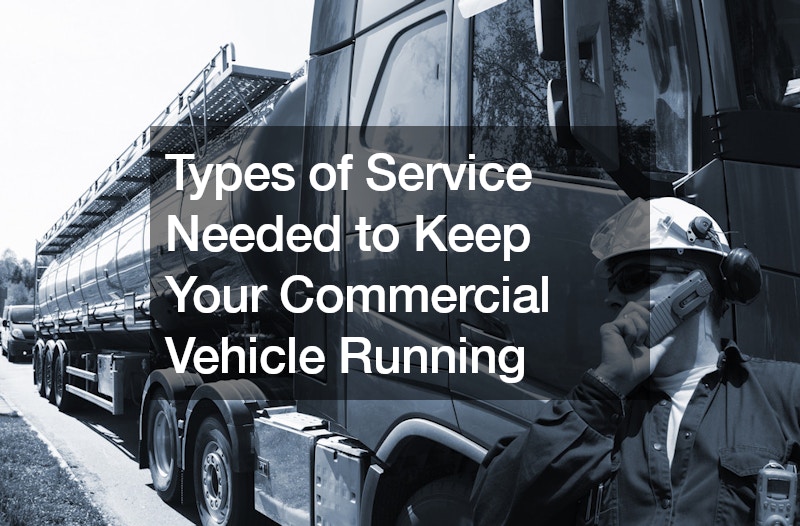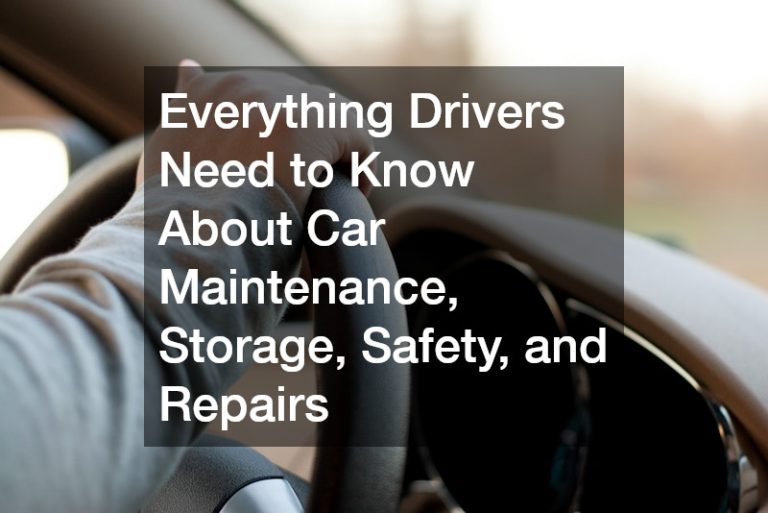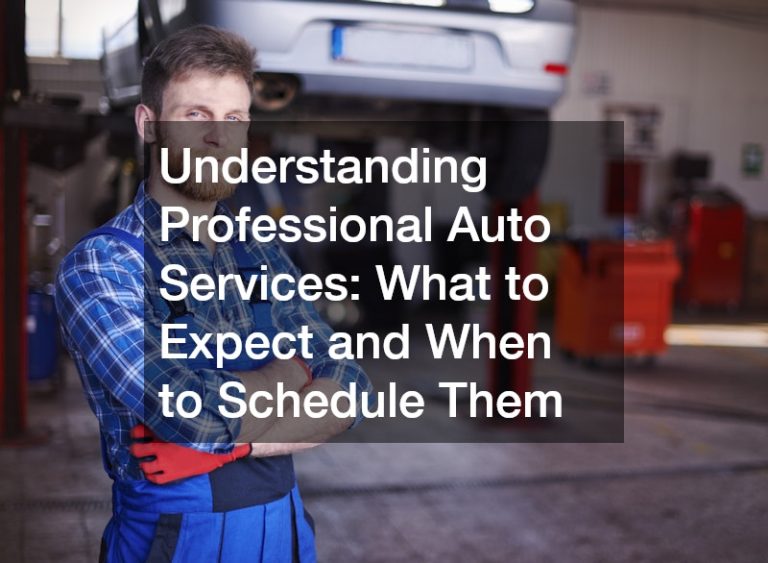

The service needed to keep your commercial vehicles running like a top can vary. However, the basic service needed by all commercial vehicles is the same. Here are some of the basics of the service needed to ensure you get the best possible return from your commercial vehicle investments.
Regular Oil Changes: Protecting Engine Health
When you evaluate the service needed to keep commercial vehicles in tip-top condition, oil changes are at the top of the list. Regular oil changes are a necessity for any vehicle, including commercial vehicles. The engine is the heart of the vehicle. Oil is like blood pumping through the heart.
To keep your commercial vehicles chugging along, regular oil changes are a must. Many business owners choose to have all their regular vehicle maintenance done based on the vehicle’s oil change schedule. For example, when an oil change is scheduled, it is also a great time to have AC maintenance, have the tires rotated, have the brakes inspected, and more. Since the vehicle will be out of commission for a few hours for the oil change, you might as well have other services done.
Regular oil changes are essential to ensure the reliability of your commercial vehicles. Oil changes remove contaminants that can cause engine breakdowns. Clean oil provides lubrication and helps to control engine temperature. Without proper lubrication, the engine experiences undue friction.
Regular oil changes can also improve fuel economy for your commercial vehicle. Regularly changing the oil in your commercial vehicles takes some of the stress off the engine. An engine that doesn’t have to work as hard uses less fuel. The savings can be significant.
Tire Maintenance: Ensuring Safety and Efficiency

Tires are critical in performance and safety. Tire maintenance can be performed during a scheduled oil change. Tire treads should be checked during maintenance to ensure the tires are still in serviceable condition.
Tire wear can tell you a lot about your vehicle. If they are worn unevenly, it could signify an alignment issue, brake problem, or suspension issue. Farm supply stores and other retail outlets required to deliver goods should know the value of good tires.
When tires become worn, it becomes a safety risk. Worn treads can affect stopping ability. It can also greatly affect traction. Regular tire maintenance is essential to safe driving.
Tires also affect fuel efficiency. Properly inflated tires can help to improve fuel economy. Ensuring tire maintenance is an easy way to reduce risk and save. Make tire maintenance a priority for your commercial vehicles.
Brake Inspections: Staying Ahead of Wear and Tear
Brake inspections are a critical service needed to ensure the safety of your commercial vehicles. Regular brake inspections help to identify worn brake pads and other components that need attention. A well-maintained braking system provides optimal stopping power and control.
During brake inspections, technicians check brake components for signs of wear, adjust brake pads and calipers as needed, and ensure fluids are at optimal levels. A brake inspection. Early interventions for brake maintenance can prevent the risk of further damage to your brake system, which can be more costly to repair.
Brake inspections can also help to keep your business compliant with state motor vehicle rules. In some cases, it is not only state motor vehicle rules you need to comply with. For example, if your business serves a private school, you may need to adhere to stricter safety regulations and have brake inspections more frequently.
Liability for an accident can be high, especially when equipment failure like poorly maintained brakes occurs. Brake failure is cited as a leading cause of commercial vehicle accidents. When you take the time to maintain your brakes, you reduce the risk of your commercial vehicle being involved in an accident.
Transmission Services: Smoother Gear Shifting

Transmission services play a vital role in maintaining the performance and longevity of commercial vehicles. It is a service needed to keep vehicle transmission smoothly shifting into gear. There are two key components to every vehicle. The engine and the transmission.
While the engine typically gets plenty of attention with oil changes and tune-ups, transmission care often falls to the wayside. The transmission plays a critical role in the operation of vehicles. It transfers power from the engine to the wheels. It is the component that makes the vehicle move forward and backward. When the transmission is faulty, the vehicle can’t be moved.
A strong transmission is essential whether your business is a mobile lending service or a delivery service. There are signs that the transmission is having problems. The vehicle may “bang” into gear, or there may be some “slippage.” Transmission maintenance is one of the best ways to avoid some of the more costly transmission problems.
Transmission care is just as important as engine care. If one or the other is not functioning, the vehicle can’t support your business. Keeping up with transmission services will ensure your commercial vehicle stays on the road where you need it to be. Protect your investment and get the service needed.
Battery Checks: Preventing Unexpected Breakdowns
Vehicle batteries have a lifespan. The closer to the end of the expected lifespan, the less reliable the battery becomes. Regular battery checks can help you stay one step ahead of unexpected breakdowns.
Nothing is more frustrating than getting an order loaded only to find that the vehicle will not turn over. Worse yet, when an employee takes the vehicle out and gets stuck somewhere. These are costly errors that can be avoided. Knowing where a battery stands can help you to plan and budget for the necessary replacement.
Being proactive about vehicle batteries can save on towing charges and other roadside assistance. You can save enough to confidently place an order with an auto window tinting company to upgrade the window tint on your business’s vehicles. More importantly, the vehicles will be reliable.
Cooling System Maintenance: Avoiding Engine Overheating

A service often overlooked is cooling system maintenance. This seasonal maintenance is essential to ensure the cooling system is fully functional. The cooling system includes several critical components that ensure the engine temperature stays consistent. The cooling system comprises hoses, radiators, thermostats, and other components.
When a vehicle overheats, it can cause serious damage to the engine. If you are a local roofing company owner or any service provider, you can’t afford even one of your vehicles to go down. Regular cooling service when the seasons change (once in the spring and once in the fall) will ensure that your vehicle’s cooling system performs optimally.
During the maintenance, the old coolant fluid will be removed, and new fluid will be added. The system will be “flushed” out, which removes contaminants and debris from the system. Pressure testing of the cooling system can identify leaks. Cooling system maintenance often involves inspecting the thermostat for proper operation. Hoses are also inspected for wear.
The coolant system on any vehicle is a vital component. You don’t want to skip out on coolant system maintenance to keep your commercial vehicles in top condition. Make coolant system maintenance a part of your vehicle maintenance plan. It is a service needed by all vehicles.
Suspension Services: Enhancing Vehicle Stability
Suspension inspections and services are needed by any commercial vehicle owner, but especially for those businesses that carry heavy loads in the vehicle. For example, a water damage cleanup company will have a lot of equipment to carry in the vehicle. Heavy loads can put a lot of wear and tear on your suspension system.
Having the suspension system inspected periodically and serviced can extend the system’s life and help you avoid breakdowns. There are several components in a suspension system that can fail. Suspension systems are made of both large, obvious components and smaller components.
Shocks, struts, springs, ball joints, tie rods, and more all form the suspension system. Any one of these components could fail. The damage caused by a failing component can range from a bumpy ride to losing a wheel while driving. The suspension system must be periodically checked and maintained.
Suspension systems play a role in engine and transmission operation. A poorly maintained suspension system can affect the engine’s performance and transmission by causing components to vibrate loose. The suspension system is responsible for weight distribution, wheel alignment, and more. It is a critical component of the vehicle.
Fuel System Cleaning: Improving Fuel Efficiency

Regular fuel system cleaning and maintenance are essential for optimizing fuel efficiency, engine performance, and vehicle reliability. Whether you own a local pest removal company or provide delivery services, you need vehicles you can depend on. Keeping the fuel system clean and well-maintained is crucial for maximizing fuel economy and reducing emissions.
Over time, carbon deposits and other contaminants can clog your fuel system. Unfortunately, once the line is completely clogged, your vehicle will not run. Early signs of a problem include hard starts, stalls, and low fuel economy. Preventive maintenance can help avoid these problems.
A clean fuel system ensures the engine receives the proper fuel and air for combustion. It can improve fuel efficiency and help you save on fuel costs. Having the preventive care needed to ensure your fuel system is working at its optimum can also improve productivity for your business.
Keeping your commercial vehicles reliable is essential to ensuring your business can provide reliable services. It can also reduce the carbon footprint of your business. When fuel systems are well-maintained, they reduce carbon emissions. Fuel system maintenance is a needed service. Make it a part of your regular maintenance schedule.
Electrical System Diagnostics: Detecting Hidden Issues
For medical hazardous waste disposal service, maintaining a reliable vehicle fleet is essential for safely and efficiently transporting hazardous materials. However, it is not only the hazardous waste removal industry that should have access to accurate electrical system diagnostics. In today’s vehicles, electrical systems play a vital role.
An electrical system failure can range from a small sending signal unit to frayed wires to software issues. These failures can affect every system in the vehicle. An unidentified electrical problem can cause starting problems, driving problems, driver assist issues, etc. It can affect both the comfort of the vehicle and performance.
Individual electrical components, such as switches, relays, fuses, and sensors, may be tested to verify their function. Testing these components helps identify faulty or malfunctioning parts that may need to be repaired or replaced to restore proper electrical system operation. Proper maintenance of the electrical system helps mitigate the risk of electrical failures.
Diagnosing electrical problems can be difficult. It takes experience and expertise to locate the root cause. A professional with the right equipment can detect hidden issues that are not obvious. No matter your business, any electrical problems in your commercial vehicles must be properly diagnosed and repaired.
Preventive Maintenance Plans: Comprehensive Vehicle Care
Commercial vehicles are an important asset to any business. Whether you own a local sewer cleaning service or another type of business, vehicles are critical in how that business operates. Many business owners prioritize preventive maintenance for their fleets.
A proactive vehicle maintenance and care approach can avoid many problems. Comprehensive maintenance plans include all the important system checks and care. Comprehensive maintenance plans help you to save money. By detecting potential problems early on, damage can be controlled. Early interventions are typically less expensive than breakdown repairs.
Reliability is enhanced when the proper maintenance is done. You can extend the life of your commercial vehicles with preventive maintenance. It can also ensure manufacturer warranties stay in good standing. Preventive maintenance ensures the service needed is performed on your commercial vehicles before the vehicle experiences performance problems.
Commercial vehicles are a high-dollar investment. Comprehensive preventive maintenance plans help protect the investment and ensure you get the expected ROI. Taking the steps to care for your commercial vehicles is crucial to the success of your business.
The right support can make a difference for your commercial vehicles. Partnering with a trusted provider to manage your commercial vehicle care will ensure you have the reliable fleet you need to grow your business. Learn more about the service needed to keep your commercial vehicles in optimal condition.



